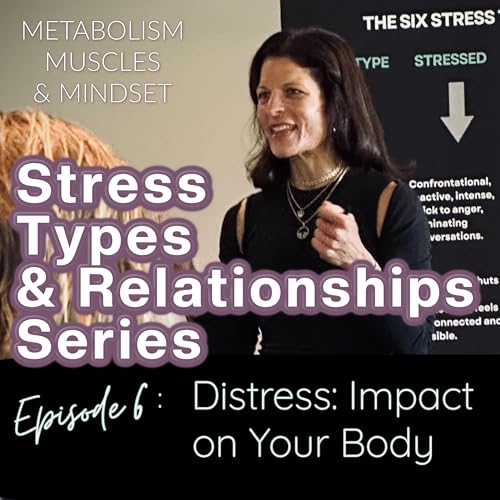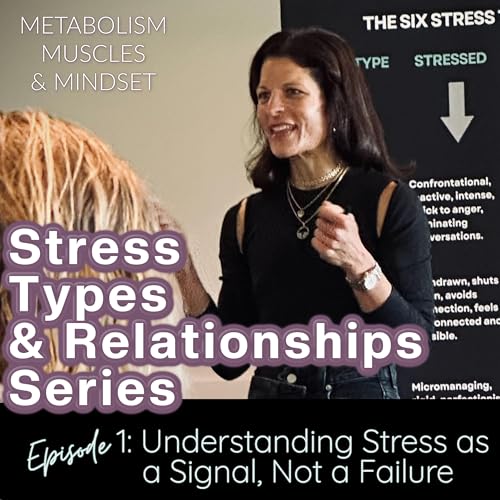Metabolism, Muscles, & Mindset Podcast with Dr. Ali Novitsky, MDStress Types & Relationships Series Episode 01: Understanding Stress as a Signal, Not a FailureWelcome to a brand-new season of Metabolism, Muscles, & Mindset! After a revitalizing summer spent in Japan and Portugal, Dr. Ali Novitsky, board-certified obesity medicine physician and strength expert, kicks off a powerful 12-part series on stress — what it really is, how it shows up in the body, and why it’s not a personal failing.In this episode, Dr. Novitsky reframes stress as a physiological signal, not a flaw. You’ll learn the science behind the HPA axis, the real impact of chronic cortisol, and how simple practices like breathwork, strength training, and time in nature can help you regulate and thrive. Plus, she teases a free stress-type quiz coming in the next episode to help you personalize your approach.🧠 Key Points Covered• Stress Is InformationStress is not the enemy — it’s a body signal that communicates where you are and what you need. Learn to identify where you carry it and how it manifests uniquely for you.• HPA Axis 101Understand how the hypothalamic-pituitary-adrenal (HPA) axis influences your hormones — especially cortisol — and how it affects your blood pressure, blood sugar, mood, memory, and focus.• Chronic Load, Real CostsProlonged stress can lead to insulin resistance, hypertension, and cognitive decline. But early regulation and nervous system care can change your health trajectory.• Regulation Beats WillpowerTrying to “push through” stress often backfires. Instead, learn how to soothe your nervous system so your habits can actually stick.• Go-To Tools for Daily RecoverySimple but powerful tools like diaphragmatic breathing, mindfulness, strength training, and being in nature restore your baseline and build resilience.• Perimenopause & StressHormonal shifts can amplify your stress response. Prioritize muscle, protein, recovery, and self-compassion during this phase.Take the Quiz Now and discover your unique stress type and match targeted tools to your patterns!⏱️ Timestamps00:00:00 – Introduction and summer recap (Japan, Portugal)00:00:43 – Announcing the 12-episode stress series00:01:14 – Boundless Life cohort experience00:02:29 – From stress workshop to episode roadmap00:03:11 – Research base & screening tool overview00:03:42 – Understanding the HPA axis00:04:46 – Reframing stress as feedback00:05:07 – Stress scale and arousal zones00:06:12 – Befriending stress signals00:06:55 – Why proactive stress care protects health00:07:27 – Regulation vs. willpower00:08:10 – “Spa” analogy for nervous system downshifting00:09:02 – How stress disrupts sleep, nutrition, and training00:10:07 – Physiology deep dive continued00:11:00 – HPA mechanics in daily life00:12:06 – Health consequences of chronic cortisol00:13:01 – Chronic stress & insulin resistance00:14:05 – Cardiovascular and cognitive effects00:16:02 – Stress in perimenopause00:16:45 – Tools: breath, mindfulness, strength, nature00:17:28 – Portugal routines: morning workouts outdoors00:18:09 – Recognizing rising stress and intervening early00:19:02 – Additive stressors & compassionate audits00:19:25 – Befriending stress to reclaim agency00:20:08 – Personal daily regulation strategies00:21:11 – Consistency beats intensity00:21:53 – Intro to six distress types00:22:25 – Quiz announcement for next episode00:22:47 – Closing and teaser for Part 2📲 Follow Dr. Ali NovitskyTikTok | Instagram | Facebook | YouTube💼 Work with Dr. Ali💪 Beginner Strength Training Program – 12 months for just $199!🔥 Transform® 10.0 – Enrollment is open! Early Bird Pricing Until October 1 - bonus content available now🧘 Total Fitness Program – A 12-month mind-body transformation🧪 Get 15% off InBody Models (USA/Canada) – Small referral commission may apply
Show more
Show less
 30 mins
30 mins 13 mins
13 mins 25 mins
25 mins 23 mins
23 mins 19 mins
19 mins Sep 28 202533 mins
Sep 28 202533 mins 23 mins
23 mins 18 mins
18 mins
